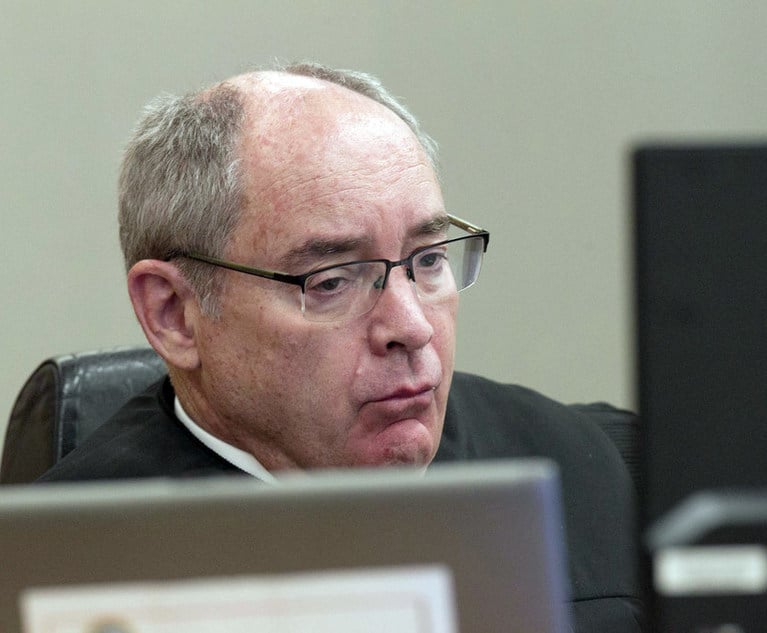 Credit: RomanR/Shutterstock.com
Credit: RomanR/Shutterstock.comIn Approving $3M Condemnation Deal, Property's Eligibility for State Incentives Was Fair Game
The ruling comes as the state's tax incentive program faces heavy scrutiny.
February 12, 2020 at 07:15 PM
4 minute read
A New Jersey appeals court has found no abuse of discretion in a judge's decision to admit expert testimony about availability of tax incentives when it set a price of $3 million for the condemnation of an eight-story building in Camden.
With the state's tax incentive program facing heavy scrutiny, the ruling should be helpful to owners of eligible properties.
Upholding a jury's award for a building that was being condemned by Camden's parking authority for construction of a new parking garage, the panel said testimony about availability of funds under the state's Grow NJ program was not admitted in error because sufficient evidence supported the expert's opinion.
The parking authority claimed on appeal that a report to the property owner, the Estate of Milton Rubin, by appraiser Richard Wolf of Valbridge Property Advisors, should not have been admitted at trial because it was too speculative. The report said the building should be renovated into Class A office space and that its rental potential was aided greatly by the availability of Grow NJ tax incentives to companies operating in Camden.
Wolf's report put the property's value at $9 million. An expert for the parking authority estimated the value at $180,000. A jury set the value at $3 million following a seven-day trial in April 2018.
On appeal, the panel of Judges Douglas Fasciale, Scott Moynihan and Stephanie Ann Mitterhoff of the New Jersey Superior Court Appellate Division noted that in 1994 the state Supreme Court set rules for deciding whether a judge may permit testimony about a property's future use in determining its value. In Commissioner of Transportation v. Caoili, the court said the jury need not find that change is probable, but the critical inquiry is the reasonable belief by the buyer and seller negotiating over a property that a change may occur and have an impact on the value of the property.
The Caoili ruling, which concerned potential rezoning for commercial use of a property that was zoned residential, said a jury deciding fair market value of a condemned property could consider a potential change affecting use of the property "provided the court is satisfied that the evidence is sufficient to warrant a determination that such a change is reasonably probable." Thus, the judge performs a "gatekeeping function by screening out potentially unreliable evidence and admitting only evidence that would warrant or support a finding that a change is probable."
Judge Michael Joyce, who conducted the trial, did not abuse his discretion in finding that evidence was sufficient to allow the jury to find that defendant would have benefited from Grow NJ had it renovated the property and subsequently rented it to a Grow NJ recipient, the panel said.
The appeals court said that Wolf's valuation was distinguishable from other cases where judges rejected valuations that were made on the assumption that improvements had already taken place. Wolf's valuation "was not based on the assumption that defendant's property had already been renovated and rented to a Grow NJ recipient," the court said.
Starting with an "as renovated" value, Wolf discounted the value to account for renovation costs, lost rent, leasing commissions and "entrepreneurial incentive," which is the profit required to purchase the building as is, find a tenant and renovate the building given the risks involved, the court said. This methodology recognizes the critical distinction between enhancing market value and constituting the basis of market value, the court said.
The parking authority's attorney, Michael Ash of Carlin & Ward in Florham Park, and Robert Baranowski of Hyland Levin Shapiro in Marlton, representing the estate of Rubin, did not respond to requests for comment.
This content has been archived. It is available through our partners, LexisNexis® and Bloomberg Law.
To view this content, please continue to their sites.
Not a Lexis Subscriber?
Subscribe Now
Not a Bloomberg Law Subscriber?
Subscribe Now
NOT FOR REPRINT
© 2024 ALM Global, LLC, All Rights Reserved. Request academic re-use from www.copyright.com. All other uses, submit a request to [email protected]. For more information visit Asset & Logo Licensing.
You Might Like
View All

MDL Judge: 'Significant Number of Plaintiffs' Can't Allege Paraquat Exposure
8 minute read
Why the Wide Range of Roundup Verdicts? It Might Depend on What Juries Hear About the EPA
8 minute read
Roundup MDL Lead Counsel Defend Fee Allocations: 'Limited Funds Available'
5 minute readTrending Stories
- 1Judge Denies Sean Combs Third Bail Bid, Citing Community Safety
- 2Republican FTC Commissioner: 'The Time for Rulemaking by the Biden-Harris FTC Is Over'
- 3NY Appellate Panel Cites Student's Disciplinary History While Sending Negligence Claim Against School District to Trial
- 4A Meta DIG and Its Nvidia Implications
- 5Deception or Coercion? California Supreme Court Grants Review in Jailhouse Confession Case
Who Got The Work
Michael G. Bongiorno, Andrew Scott Dulberg and Elizabeth E. Driscoll from Wilmer Cutler Pickering Hale and Dorr have stepped in to represent Symbotic Inc., an A.I.-enabled technology platform that focuses on increasing supply chain efficiency, and other defendants in a pending shareholder derivative lawsuit. The case, filed Oct. 2 in Massachusetts District Court by the Brown Law Firm on behalf of Stephen Austen, accuses certain officers and directors of misleading investors in regard to Symbotic's potential for margin growth by failing to disclose that the company was not equipped to timely deploy its systems or manage expenses through project delays. The case, assigned to U.S. District Judge Nathaniel M. Gorton, is 1:24-cv-12522, Austen v. Cohen et al.
Who Got The Work
Edmund Polubinski and Marie Killmond of Davis Polk & Wardwell have entered appearances for data platform software development company MongoDB and other defendants in a pending shareholder derivative lawsuit. The action, filed Oct. 7 in New York Southern District Court by the Brown Law Firm, accuses the company's directors and/or officers of falsely expressing confidence in the company’s restructuring of its sales incentive plan and downplaying the severity of decreases in its upfront commitments. The case is 1:24-cv-07594, Roy v. Ittycheria et al.
Who Got The Work
Amy O. Bruchs and Kurt F. Ellison of Michael Best & Friedrich have entered appearances for Epic Systems Corp. in a pending employment discrimination lawsuit. The suit was filed Sept. 7 in Wisconsin Western District Court by Levine Eisberner LLC and Siri & Glimstad on behalf of a project manager who claims that he was wrongfully terminated after applying for a religious exemption to the defendant's COVID-19 vaccine mandate. The case, assigned to U.S. Magistrate Judge Anita Marie Boor, is 3:24-cv-00630, Secker, Nathan v. Epic Systems Corporation.
Who Got The Work
David X. Sullivan, Thomas J. Finn and Gregory A. Hall from McCarter & English have entered appearances for Sunrun Installation Services in a pending civil rights lawsuit. The complaint was filed Sept. 4 in Connecticut District Court by attorney Robert M. Berke on behalf of former employee George Edward Steins, who was arrested and charged with employing an unregistered home improvement salesperson. The complaint alleges that had Sunrun informed the Connecticut Department of Consumer Protection that the plaintiff's employment had ended in 2017 and that he no longer held Sunrun's home improvement contractor license, he would not have been hit with charges, which were dismissed in May 2024. The case, assigned to U.S. District Judge Jeffrey A. Meyer, is 3:24-cv-01423, Steins v. Sunrun, Inc. et al.
Who Got The Work
Greenberg Traurig shareholder Joshua L. Raskin has entered an appearance for boohoo.com UK Ltd. in a pending patent infringement lawsuit. The suit, filed Sept. 3 in Texas Eastern District Court by Rozier Hardt McDonough on behalf of Alto Dynamics, asserts five patents related to an online shopping platform. The case, assigned to U.S. District Judge Rodney Gilstrap, is 2:24-cv-00719, Alto Dynamics, LLC v. boohoo.com UK Limited.
Featured Firms
Law Offices of Gary Martin Hays & Associates, P.C.
(470) 294-1674
Law Offices of Mark E. Salomone
(857) 444-6468
Smith & Hassler
(713) 739-1250






